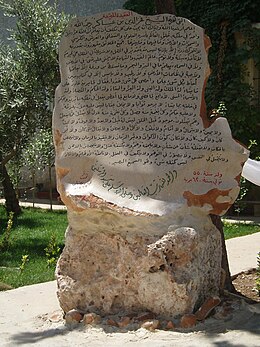
Back الماوردي Arabic আল-মাওয়ার্দী Bengali/Bangla Al-Māwardī German Al-Mawardi Spanish ابوالحسن ماوردی FA Al-Mâwardi French Abu Al-Hasan Al-Mawardi ID Al-Mawardi Italian Al-Mawardi JV Mawerdî KU
al-Mawardi | |
|---|---|
| Abbasid Chief Judge | |
| In office 1000s–1058 | |
| Abbasid official and Diplomat | |
| In office 1031, 1037, 1042, 1043 | |
| Personal life | |
| Born | Ali c. 972 |
| Died | 27 May 1058 (30 Rabi'a 450 AH) |
| Children | Hasan |
| Parent | Muhammad ibn Habib |
| Era | Islamic Golden Age (Later Abbasid era) |
| Region | Iraq |
| Main interest(s) | Aqidah, (Islamic theology), Tawhid, Islamic Jurisprudence, Principles of Islamic jurisprudence, Sharia, Hadith, Tafsir, Sociology, Political Science |
| Notable work(s) |
|
| Known for | Works on Religion, Government, the Caliphate, and Public and constitutional law during a time of political turmoil. |
| Religious life | |
| Religion | Islam |
| Denomination | Sunni |
| Jurisprudence | Shafi'i |
| Creed | Ash'ari[1][2] |
| Muslim leader | |
Influenced by | |
Influenced | |
| Part of a series on |
| Ash'arism |
|---|
 |
| Background |
Ali ibn Muhammad ibn Habib (Arabic: علي إبن محمد إبن حبيب, romanized: ʻAlī ibn Muḥammad ibn Ḥabīb; c. 974–1058), commonly known by the nisba al-Mawardi (Arabic: الماوردي, romanized: al-Māwardī), was a Sunni polymath and a Shafi'i jurist, legal theoretician, muhaddith, theologian, sociologist and an expert in political science.[3][4] He is considered to be an eminent scholar of his time who wrote on numerous subjects, including Qur'anic interpretations, religion, government, public and constitutional law, language, ethics and belles-lettres.[5]
- ^ IslamKotob. "Actions are by Intentions - إنما الأعمال بالنيات)". p. 32.
- ^ Jackson, Sherman (1996). Islamic Law and the State The Constitutional Jurisprudence of Shihāb Al-Dīn Al-Qarāfī. Brill. p. 21. ISBN 978-90-04-10458-7.
- ^ Josef W. Meri (2006). Medieval Islamic Civilization: L-Z, index. Routledge. p. 486.
- ^ Gibril Fouad Haddad (2 May 2015). "Shaykh Abu al-Hassan al-Mawardi (362 AH - 448 AH, age 86 years old)". The Biographies of the Elite Lives of the Scholars, Imams & Hadith Masters. Zulfiqar Ayub. p. 200.
- ^ "About The Author". kitaabun.com.